About
Prof. Peteet’s newest book Space and Mobility in Palestine, (forthcoming University of Pennsylvania Press) argues that mobility is key to the elaboration and affirmation of place as spaces of particular forms of power, identity, and meaning in a contemporary settler-colonial context. Israeli policies of closure and separation, and their associated physical structures and bureaucratic requirements and procedures (the wall, checkpoints, the road system and permits), dramatically constrain Palestinian mobility, impede their ability to construct and give meaning to place and are critical to opening up space to be reconfigured along new, and exclusionary, demographic lines of identity and affiliation. This book analyzes how Palestinians comprehend, experience, narrate, and respond to late modern Israeli colonialism with its relentless acquisition of land (and water), settlement building, and practices such as separation and closure, to spatially fracture and immobilize them. Several key concepts and processes are at play: a colonial occupation with a complex set of regulatory practices, the imposition of calibrated chaos, punishment and rule through the construction of spaces of disorder, the application of bio-metric technologies of surveillance and monitoring to control mobility and velocity, all of which rest upon the elaboration and management of social categories of difference along which the partitioning of, and access to space, is organized.
Spring 2014, Dr. Peteet will be in Jordan on an NEH grant to work on “The Cultural Politics of Baths (hammamas) in Jordan.” This research project explores Turkish baths in Jordan in the context of cultural refashioning and its temporal dimension: in other words: in what larger political and cultural context, is the revival of the hammamas unfolding, and why now? I pose a series of interrelated questions about the re-invigoration of a once nearly moribund cultural space and practice. Is this resurgence related to the cultural politics of Turkey’s new regional prominence as exemplified by their stance as political broker, a modern neo-liberal Islamic state, and their actions after the 2009 Gaza flotilla incident? In Jordan, there is a new interest in all things Turkish, from media and aesthetics to language and culture more broadly. The revival of baths raises theoretical questions about cultural artifacts, heritage and aesthetics, memory, social practices and space, complex notions of hygiene and the body in Islam, neo-liberal consumptions patterns, and regional cultural politics.

